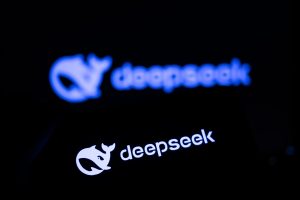The U.S. government is investigating whether the Chinese artificial intelligence (AI) company DeepSeek has been using U.S. chips that are barred from being shipped to China, including from third parties in Singapore.
In a report on Friday, Reuters quoted a source as saying that the U.S. Commerce Department is looking into whether the firm had obtained advanced Nvidia graphics processing unit (GPU) chips that are subject to tight U.S. export controls.
Bloomberg also reported on Friday that officials in the White House and Federal Bureau of Investigation are “also trying to determine whether DeepSeek used intermediaries” based in Singapore to obtain the Nvidia GPUs.
Earlier this month, DeepSeek released its R1 AI model, which the Hangzhou-based company claims is able to achieve equivalent results to the leading U.S. models, though at much greater efficiency and just a fraction of the cost. Nearly overnight, DeepSeek had shot to the top of the list of most downloaded apps in Apple’s App Store. It also prompted profound questions about the resource- and data-intensive approach of the leading U.S. AI firms, including OpenAI. This precipitated a market collapse that wiped more than $1 trillion off U.S. technology stocks.
The success of DeepSeek also raised questions about the efficacy of the complex export restrictions put in place by President Joe Biden in a bid to prevent the export of the most sophisticated AI chips, and the tools used to produce them, to China. The goal of these restrictions is to hamstring Beijing’s efforts to develop its own chip-making industry and prevent Beijing from developing AI capabilities that could give the country a military edge.
Just days before leaving the White House, Biden introduced the Framework for Artificial Intelligence Diffusion, which not only restricts the sale of advanced chips to adversary nations like China but also caps their acquisition by a host of other countries.
Amid the bloodbath on Wall Street, there were immediate accusations from Deepseek’s U.S. rivals that the R1 model had actually been trained with advanced Nvidia chips, including cutting-edge H100 GPUs, that are subject to U.S. export controls. Dario Amodei, the CEO of the competing AI company Anthropic, said that it was likely that “a substantial fraction of DeepSeek’s AI chip fleet consists of chips that haven’t been banned (but should be), chips that were shipped before they were banned; and some that seem very likely to have been smuggled.”
DeepSeek has not revealed what hardware it used to train its R1 model, but according to Bloomberg, its researchers said that the firm’s V3 model, released last month, was trained on 2,048 of Nvidia’s H800 chips. The H800 was created for the Chinese market after the imposition of the Biden administration’s chip export controls, only to be barred itself in late 2023. The company reportedly also has access to Nvidia’s H20 chip, which Nvidia created as a less powerful substitute for the Chinese market after the H800 was banned. In the wake of the DeepSeek shock, the Trump administration is now considering banning the sale of the H20 to China as well.
It remains to be seen whether the claims that DeepSeek is using banned Western technology are simply an elaborate form of “cope” on the part of its embarrassed AI developers, but the U.S. government has expressed its concerns about the smuggling of AI chips to China for some time. Indeed, almost as soon as the Biden administration’s export controls were introduced, there have been reports of “leakage.” In August last year, The Information reported that “a large-scale industry has evolved to get Nvidia’s most cutting-edge chips to Chinese buyers, via a network of smugglers using shell companies and phony data centers.” In December, the U.S. Commerce Department asked Nvidia to look into how the company’s most advanced products had ended up in China over the past year.
One of the main alleged sources of smuggled chips is Singapore, which suspiciously now accounts for 22 percent of Nvidia’s revenue, up from 9 percent two years ago. In a letter to National Security Adviser Mike Waltz, U.S. lawmakers last week called for a review on whether Washington should strengthen controls on shipments through third countries, including Singapore, that “pose a high risk of diversion.”
“Countries like Singapore should be subject to strict licensing requirements absent a willingness to crack down on PRC transshipment through their territory,” the letter read. The anonymous source cited by Reuters said that organized AI chip smuggling to China has also been tracked out of Malaysia and the United Arab Emirates.
Nvidia claims that many of its customers have business entities in Singapore and that the chips purchased were actually shipped to the U.S. and other Western countries, rather than to Singapore itself. “We insist that our partners comply with all applicable laws, and if we receive any information to the contrary, act accordingly,” Nvidia said, as per Reuters.
Singapore, too, says that it is unaware of any smuggling taking place in the country, but that it expected U.S. companies to adhere to both U.S. export regulations and Singapore’s own domestic legal framework. “Major U.S. and European companies have significant operations here,” the Ministry of Trade and Industry said in a statement on Saturday. “Nvidia has also stated that there is no reason to believe that DeepSeek obtained any export-controlled products from Singapore.”

































